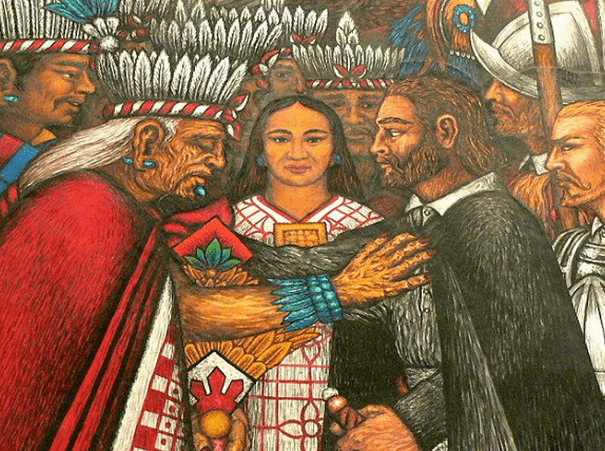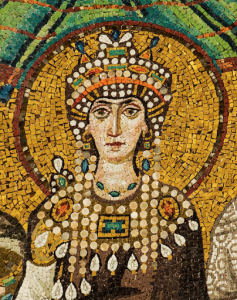Winner of the Fall 2016 StMU History Media Award for
Best Article in the Category of “People”
Best Article in the Category of “World History”
Largely due to the importation of disease and use of superior weapons, the Spaniards were able to conquer the Aztec capital of Tenochtitlan, kill the empire’s last emperor, Cuauhtémoc, and bring the Aztec empire to an end. Few know of La Malinche, the indigenous interpreter of Hernán Cortés, whose linguistic abilities were used to facilitate important conversations between the Spaniards and the indigenous leaders. Without the help of La Malinche, perhaps the Aztec empire would have survived.
Born between 1502 and 1505, La Malinche was named Malinalli Tenepal, the first part of her name being a Nahuatl term for the twelfth day of the month in correspondence to the Aztec calendar, and the second part of her name meaning “lively.” She was born of nobility in Paynala within the region of Veracruz. Her troubles started at a young age after the death of her father. La Malinche was ousted from her home to ensure her new half-brother received the inheritance of the family instead of her, since she was the eldest child. She was given to “some Indians of Xicalango.”1 Then the Indians gave her to a nobleman in Tobasco, a region in the Yucatan. When Cortés arrived to Tobasco, he was offered twenty slaves, one of them being La Malinche. Having lived in Veracruz, a Nahuatl-speaking region, and then being sold into a Maya-speaking region, La Malinche knew both languages and she was soon recognized for the linguistic talents that could benefit Cortés in his conquests.2

The few glimpses of La Malinche and how her presence as an interpreter accelerated the fall of the Aztec empire can be found in the writings of the Spanish explorers, specifically from Hernán Cortés, her “lord and master.”3 From the second letter Hernán Cortés wrote to Emperor Charles V, dated October 30, 1530, Cortés speaks of La Malinche as “a female interpreter that I had, who was a native of this country, and whom I obtained at Putunchún on the Rio Grande.”4 This confirms the vague aspects of her life that we already know. But most importantly, in this context, this letter goes on to tell of a scenario in which La Malinche saved the Spaniards from an ambush by the Cholulans. La Malinche was told by the wife of a native leader that they planned to attack the Spaniards and if La Malinche came with them, she would be protected. La Malinche delivered this message to Cortés, which ultimately led to the massacre of Cholula and provided a direct path to march towards Tenochitlan, the capital of the Aztec empire.5 This leads to the question of whether or not La Malinche was a traitor or a survivor. Did she explicitly want the Aztec empire to fall or did she just want to save herself from the carnage?
With no traces of primary sources from La Malinche herself, her story has been retold by various scholars without much consistency, nothing ever being certain. Up until the twentieth century, La Malinche was viewed as a traitor to her country Mexico. In 1861, on the celebration day of Mexico’s Independence, Ignacio “El Nigromante” Ramírez, a Mexican journalist, addressed the Mexican people by saying, “One of the mysteries of fate is that every Mexican owes his downfall and disgrace to a woman, and to another woman his salvation and glory; the myth of Eve and Mary is reproduced everywhere; we indignantly remember Cortés’s mistress and will never forget, in our gratitude to Doña María Josefa Ortiz.”6 La Malinche is seen as playing a key role in the subjugation of the Mexican peoples to Spain, while Doña María Josefa Ortiz did the contrary and liberated the country. However, many Chicana writers and modern scholars are trying to rewrite the tale of La Malinche to understand the complexities of her choices and to vindicate her. For example, Gloria Anzaldua promotes the idea that La Malinche had a “new consciousness,” that she voluntarily served as the interpreter of Cortés not only to save herself, but also because she knew that a new mestiza culture was going to be born (especially considering she had a son with Cortés in 1524).7 She made a conscious effort to exchange language and cultural aspects from each side in order to facilitate the emergence of the new mestiza society; however, with that came brutal consequences in the shape of warfare and mass death in the New World.
Whether or not La Malinche’s role as Cortés’s interpreter was traitorous, simply an effort to survive, or some other complex reason involving love for Cortés, hate for the Aztec empire for the cruelty she faced after being ousted from her home, or promotion of the new mestiza culture, no one will ever know the true story of the Indian, slave woman who traveled alongside Cortés towards the culmination of the Aztec empire.
- Bernal Castillo del Díaz, The Discovery and Conquest of Mexico, 1517-1521 rev. American ed., trans. A.P. Maudsley (New York: The Noonday Press, 1965), chap. 22-23. ↵
- Pilar Godayol, “Malintzin/ La Malinche/ Doña Marina: re-reading the myth of the treacherous translator,” Journal of Iberian and Latin American Studies 18, no. 1 (April 2012): 61-68. ↵
- Castillo del Bernal, chap 23. ↵
- Hernan Cortes to Emperor Charles V, October 30, 1520, in Letters of Despatches of Hernando Cortes, to the Emperor Charles V., trans. (New York: Wiley and Putnam, 1843), letter II. ↵
- Hernan Cortes to Emperor Charles V, October 30, 1520, in Letters of Despatches of Hernando Cortes, to the Emperor Charles V, letter II. ↵
- Rosario Pérez-Lagunes, “The Myth of La Malinche: From the Chronicles to Modern Mexican Theater” (PhD dis., Virginia Polytechnic Institute and State University, 2001), 24. Although she was of Spanish descent, Doña María Josefa Ortiz was born in Valladolid, Mexico in 1768 and identified herself as Mexican. She and her husband were both a part of the rebellion that ultimately led to Mexico’s independence from Spain in 1824. ↵
- Godayol, 68-70. ↵



230 comments
Melyna Martinez
This article really showcases an interesting story that most people see as the downfall of natives. As La Malinche betrayed her people by being that brings between the natives and the Spanish becoming Corteze’s translator. I do believe that the article gives a good point of view of her effects on history but how she herself was a survivor and did what she had to do.
Alejandro Fernandez
This specific article capitalizes on the two contrasting sides to La Malinche and her unique historical journey. For example, the author describes how La Malinche was a translator for. Hernan Cortez yet is partially responsible for the fall of the Aztec Empire. Though she can be described as a “traitor” from her community, she is responsible for merging Native and Spanish conquistadores. Regardless of your stance, she cannot be denied as an important historical figure and is well-described through this article.
Jared Sherer
The article written about La Malinche was well written and interesting to read. The author, Ms. Sandoval writes well, makes a good presentation, and explains in detail La Malinche’s upbringing. It appears to me that her upbringing was part of the reason she worked with Cortes to bring down the Aztec empire. The author hints that there were very few research sources for this portion of the topic and that we can not really tell how La Malinche was feeling toward working with Cortes, since La Malinche did not write down her thoughts. Miss Sandoval did a great job with this article and explained each point of La Malinche’s life in a well detailed fashion.
Marie Peterson
Firstly, congratulations to the author on their award. This article does a great job of showing the multiple sides of her story. It allows you to more deeply understand her possible reasons for what she did. As well, it was interesting to learn more about someone who changed the course of history so drastically but there is barely any history about her story and what really occurred. Great Job!
Priscilla Leal
Amazing telling of the story of La Malinche. There are several takes on what her motives were for helping Cortes take down an empire, I personally like the idea of La Malinche doing what she had to do in order to survive in a time where a lot of natives were being killed. Where women were being seen as disposable, she found a purpose within herself.
Brandon Vasquez
Great Article! There are a lot of theories that are brought up in this article as to how and why she decided to help Cortes interpret with other indigenous leaders. While we don’t have record of La Malinche we can kind of build our own beliefs on what happened maybe if we did have more record of her and what really happened we would have a different stance on her.
Jacob Salinas
This was such an interesting article to read. This article does a good job of laying out both sides of La Malinche. She was the translator for Hernan Cortez and the Natives. La Malinche was one of the key reasons for the fall of the Aztec Empire. Supposedly, La Malinche crossed her Native people to help Hernan Cortez conquer the Aztec Empire.
Lorena Martinez Canavati
I think this was a well-written article because it sheds new light on this woman. I didn’t really know much of her history before reading this article, but I did know that she helped Hernan Cortes translate certain things. I didn’t know she was a royal traded into slavery. I congratulate you on the prizes you won, I think they’re much deserved. Interesting article that is not biased towards any side. It invited you to look at La Malinche differently.
Christopher Morales
You detailed the complexity of this story very well. You acknowledge the challenge without primary sources in a professional way. It is amazing how we know so little of someone who changed the history which I am a descendant from. I liked how you pointed out her life story which created her opinions and perspectives. She was ousted from her home and given as a slave. She would become a mother. The love for her child might have prompted her, but many other reasons could be to blame. You were right to acknowledge we do not know her perspective or the full story. Maybe our perspectives of her would be different if we did. You did a great job of orchestrating this thought.
Hailey Koch
I really enjoyed reading your article, and congratulations on getting an award! Stories were being told about La Malinche, but no one was very certain everything was true they would just continue to tell the stories they had heard. Scholars would tell her story, but it was never a consistent story so no one really knew the exact truth. As the 20th century came about people finally got some new information on La Malinche and that would be she was known to be a traitor to her very own country.